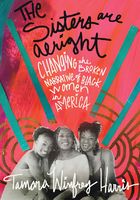
第3章 Preface
I love black women.
I love the Baptist church mothers in white.
I love the YouTube twerkers.
I love the sisters with Ivy League degrees and the ones with GEDs.
I love the big mamas, ma'dears, and aunties.
I love the loc-wearing sisters who smell like shea butter.
I love the ladies of the "Divine Nine."
I love the "bad bitches" in designer pumps and premium lacefronts.
I love the girls who jumped double Dutch and played hopscotch.
I love the Nam-myoho-renge-kyo chanters, the seekers, and the atheists.
I love the awkward black girls and the quirky black girls and the black girls who listen to punk.
I love the "standing at the bus stop, sucking on a lollipop" 'round the way girls.
Black womanhood-with its unique histories and experiences-marks its possessors as something special.
I love black women, and I want the world to love black women, too.
It doesn't, though. I know this in my bones, from forty-five years of black-woman being. The world does not love us-at least not in the way black women deserve to be loved-because it doesn't truly see us. Our authentic collective and individual selves are usually hidden by racist and sexist stereotypes that we can't seem to shake-or rather, images that other folks won't let us shake. This is confirmed for me every time I read another article about a little black girl sent home from school, not for bad behavior or bad grades, but for having kinky black hair; every time some well-meaning pundit or preacher offers advice to "fix" black women to be more marriageable; every time some hack comedian tells a specious joke about tyrannical black wives and girlfriends; every time some black female performer is called a "ho" for baring her bodacious booty, while her male counterparts stay slapping asses in their videos to cheers and applause; every time a black woman gets murdered by the police or her partner or some scared homeowner with a gun in a Detroit suburb.
I am not an organizer. I am not much of a fighter. But I have faith in my way with words. I can write. And so, about eight years ago, I began writing about race and gender and the way they intersect with current events, pop culture, and politics-first on my own blog, What Tami Said, and then in other places.
My idea for a book was born out of the demeaning and tiresome nattering about the "black marriage crisis"-a panic that seemed to reach a peak a few years ago with endless magazine articles, TV specials, and books devoted to what black women might be doing wrong to so often remain unchosen. In researching that issue, I realized that the shaming directed at single black women is part of something much, much bigger-a broader belief in our inherent wrongness that we don't deserve.
I wrote The Sisters Are Alright out of anger. (Yes, I am an angry black woman. And justifiably so.) I wrote it because my sisters deserve better. I wrote it because I want black women to be seen. I wrote it because I want to be seen. And I wrote this book because even if the world won't love us, I want black women to love themselves and to love each other. The most frustrating sentence I've heard uttered by a black woman-and I've heard it many times-is "You know how we are." It is rarely said in reference to anything positive. That damnable sentence is a sad illustration of the many ways black women can't help but absorb the biases against us and the ways that we can be complicit in our own oppression. And it shows how hard it is to love yourself when everyone insists you are unlovable. I have two young nieces. I want the world to see their black-girl awesome and I want to make sure that they see it, too-always and no matter what. If they say, "You know how we are," I want it to be in reference to their cleverness, their confidence, and their beauty-not some stereotypical quality that is a reduction of who they are. I wrote this book for them.
Black women are a million different kinds of amazing. It is not our race or gender that makes this true; it is, as I will say later in this book, our humanity. This book is about that humanity-the textured, difficult, and beautiful humanity that lies in the hearts of all the black women I love.